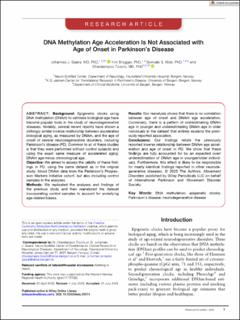| dc.contributor.author | Gaare, Johannes Jernqvist | |
| dc.contributor.author | Brügger, Kim | |
| dc.contributor.author | Sanchez Nido, Gonzalo | |
| dc.contributor.author | Tzoulis, Charalampos | |
| dc.date.accessioned | 2023-12-21T13:57:38Z | |
| dc.date.available | 2023-12-21T13:57:38Z | |
| dc.date.created | 2023-10-06T12:23:51Z | |
| dc.date.issued | 2023 | |
| dc.identifier.issn | 0885-3185 | |
| dc.identifier.uri | https://hdl.handle.net/11250/3108653 | |
| dc.description.abstract | Background
Epigenetic clocks using DNA methylation (DNAm) to estimate biological age have become popular tools in the study of neurodegenerative diseases. Notably, several recent reports have shown a strikingly similar inverse relationship between accelerated biological aging, as measured by DNAm, and the age of onset of several neurodegenerative disorders, including Parkinson's disease (PD). Common to all of these studies is that they were performed without control subjects and using the exact same measure of accelerated aging: DNAm age minus chronological age.
Objective
We aimed to assess the validity of these findings in PD, using the same dataset as in the original study, blood DNAm data from the Parkinson's Progression Markers Initiative cohort, but also including control samples in the analyses.
Methods
We replicated the analyses and findings of the previous study and then reanalyzed the dataset incorporating control samples to account for underlying age-related biases.
Results
Our reanalysis shows that there is no correlation between age of onset and DNAm age acceleration. Conversely, there is a pattern of overestimating DNAm age in younger and underestimating DNAm age in older individuals in the dataset that entirely explains the previously reported association.
Conclusions
Our findings refute the previously reported inverse relationship between DNAm age acceleration and age of onset in PD. We show that these findings are fully accounted for by an expected over/underestimation of DNAm age in younger/older individuals. Furthermore, this effect is likely to be responsible for nearly identical findings reported in other neurodegenerative diseases. © 2023 The Authors. Movement Disorders published by Wiley Periodicals LLC on behalf of International Parkinson and Movement Disorder Society. | en_US |
| dc.language.iso | eng | en_US |
| dc.publisher | Wiley | en_US |
| dc.rights | Attribution-NonCommercial-NoDerivatives 4.0 Internasjonal | * |
| dc.rights.uri | http://creativecommons.org/licenses/by-nc-nd/4.0/deed.no | * |
| dc.title | DNA Methylation Age Acceleration Is Not Associated with Age of Onset in Parkinson's Disease | en_US |
| dc.type | Journal article | en_US |
| dc.type | Peer reviewed | en_US |
| dc.description.version | publishedVersion | en_US |
| cristin.ispublished | true | |
| cristin.fulltext | original | |
| cristin.qualitycode | 1 | |
| dc.identifier.doi | 10.1002/mds.29574 | |
| dc.identifier.cristin | 2182421 | |
| dc.source.journal | Movement Disorders | en_US |
| dc.source.pagenumber | 2064-2071 | en_US |
| dc.identifier.citation | Movement Disorders. 2023, 38 (11), 2064-2071. | en_US |
| dc.source.volume | 38 | en_US |
| dc.source.issue | 11 | en_US |

